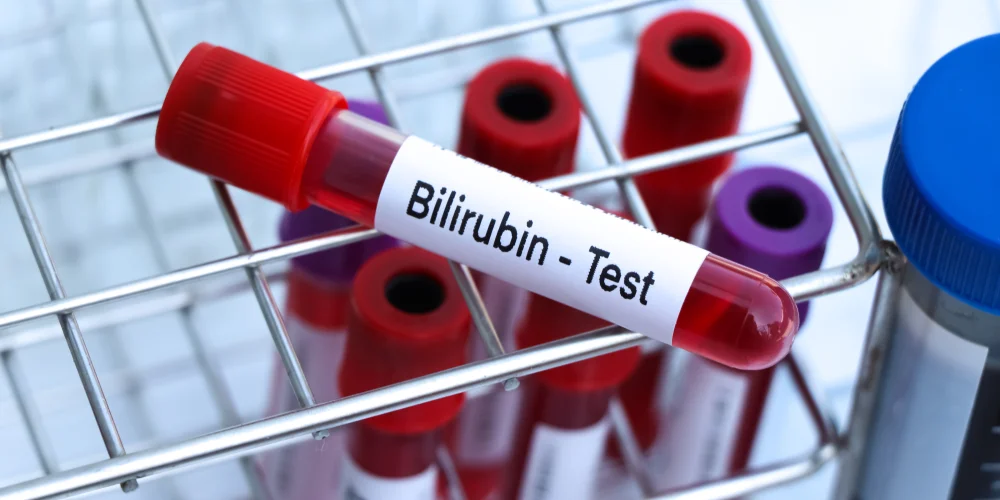Serum Bilirubin Test
Measuring Serum Bilirubin Levels
This test, called the S.Bilirubin Test is a blood test which measures the level of bilirubin present within the bloodstream. Bilirubin is a yellowish color that is produced by the destruction of red blood cells within the liver, is an indicator of the health of the liver and overall function. Higher levels of bilirubin may signal liver problems like cirrhosis, hepatitis and bile duct obstructions or other conditions that affect the destruction in red blood cells like hemolytic anemia. Through the examination of bilirubin levels this test can aid in the identification and treatment of these diseases and aids healthcare professionals in determining the best treatment options to treat the underlying liver and blood-related issues.

When is the S.Bilirubin Test Prescribed?
It is the S.Bilirubin Test is recommended in various clinical scenarios:
- Liver Function Assessment : To determine the function of the liver and determine if liver disease is present, such as liver cirrhosis or hepatitis. liver cancer.
- Assessment of Jaundice : to identify the root cause of jaundice an illness that is characterized by the an increase in the color of the eyes and skin.
- Anemia Diagnosis : To study the causes of anemia relating to the destruction in red blood cells.
- Bile Duct Obstruction : To identify obstructions or anomalies within the bile ducts which could impact the bilirubin levels.
Preparation for the S.Bilirubin Test
A special preparation is not typically required to take testing the S.Bilirubin Test. Patients are able to consume a healthy diet and drink water prior to the test. However, it is essential to inform your doctor about any medication, supplements or recent ailments you’ve been diagnosed with, as these can affect the results of the test. This will allow for a more accurate assessment of the bilirubin level within your blood. This is assisting in the detection and treatment of liver diseases as well as bile duct issues and other conditions that affect the breakdown of red blood cells.
Parameters Considered During S.Bilirubin Test
It is the S.Bilirubin Test is an essential blood test that identifies three major components of bilirubin within the bloodstream. Total Bilirubin measurement covers directly (conjugated) as well as indirect (unconjugated) Bilirubin. It is a reflection of the bilirubin level in blood. Direct Bilirubin specifically is the bilirubin that is processed by the liver, and is ready to be excreted via the bile. Indirect Bilirubin is the bilirubin that is bound to albumin in blood, which is waiting for processing in the liver. These parameters can help diagnose and monitor liver problems and bile duct problems, and conditions that can affect the breakdown of red blood cells. There is generally no specific preparation needed to perform this test, but providing healthcare professionals with information about any supplements, medications or any recent illness is crucial for a precise interpretation of results.
Time Required for S.Bilirubin Test Report
It is the S.Bilirubin Test is an efficient procedure. After taking the blood sample, results are usually ready within a couple of hours. This quick turnaround time permits healthcare professionals to quickly determine the bilirubin level and recommend appropriate treatment or a further examination should it be required.
S.Bilirubin Test Price
The S.Bilirubin Test price is Rs200, providing access to the most important diagnostic tests for the health of your liver and the levels of bilirubin.
Book an Appointment for S.Bilirubin Test
Scheduling an appointment for your S.Bilirubin Test at Chirayu Super Speciality Hospital in Bhayandar is easy. Our pathology lab in Bhayandar allows you to conveniently book an appointment through our website or by contacting our team. We are committed to providing professional and efficient service to meet your healthcare needs.
What Our Patients Say
Hear from our valued patients about their experiences at Chirayu Super Speciality Hospital and how our care has made a positive impact on their health and well-being.


Convenient booking process and efficient testing at Chirayu Hospital.


Detailed report helped my doctor diagnose my liver condition accurately.


Courteous staff and minimal waiting time for my test appointment.


Highly recommended for anyone needing liver function assessment.


Affordable testing with clear explanations of my bilirubin levels.


Quick results and professional service for my S. Bilirubin Test.
Frequently Asked Questions
Here, we provide answers to some of the most commonly asked questions to help you better understand our services, policies, and facilities. If you have any additional questions, please do not hesitate to contact us.
Bilirubin is a yellowish pigment produced during the breakdown of red blood cells.
It helps diagnose liver disorders, bile duct issues, and conditions affecting red blood cell breakdown.
No special preparation is required. Inform your healthcare provider about any medications or supplements you are taking.
Abnormal levels can indicate liver diseases, bile duct obstruction, or disorders affecting red blood cell breakdown.
Yes, certain medications can influence bilirubin levels. Inform your healthcare provider about any medications you are taking before the test.